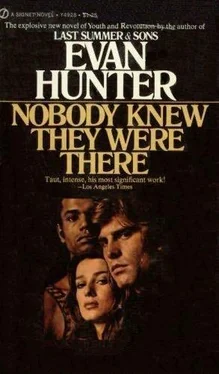Evan Hunter - Nobody Knew They Were There
Здесь есть возможность читать онлайн «Evan Hunter - Nobody Knew They Were There» весь текст электронной книги совершенно бесплатно (целиком полную версию без сокращений). В некоторых случаях можно слушать аудио, скачать через торрент в формате fb2 и присутствует краткое содержание. Город: New York, Год выпуска: 1971, ISBN: 1971, Издательство: Doubleday & Company, Жанр: Проза, на английском языке. Описание произведения, (предисловие) а так же отзывы посетителей доступны на портале библиотеки ЛибКат.
- Название:Nobody Knew They Were There
- Автор:
- Издательство:Doubleday & Company
- Жанр:
- Год:1971
- Город:New York
- ISBN:978-0094575004
- Рейтинг книги:4 / 5. Голосов: 1
-
Избранное:Добавить в избранное
- Отзывы:
-
Ваша оценка:
- 80
- 1
- 2
- 3
- 4
- 5
Nobody Knew They Were There: краткое содержание, описание и аннотация
Предлагаем к чтению аннотацию, описание, краткое содержание или предисловие (зависит от того, что написал сам автор книги «Nobody Knew They Were There»). Если вы не нашли необходимую информацию о книге — напишите в комментариях, мы постараемся отыскать её.
Nobody Knew They Were There — читать онлайн бесплатно полную книгу (весь текст) целиком
Ниже представлен текст книги, разбитый по страницам. Система сохранения места последней прочитанной страницы, позволяет с удобством читать онлайн бесплатно книгу «Nobody Knew They Were There», без необходимости каждый раз заново искать на чём Вы остановились. Поставьте закладку, и сможете в любой момент перейти на страницу, на которой закончили чтение.
Интервал:
Закладка:
“The train comes through on the second,” Raines says.
“You’ve made our position impossible,” Hester says.
“We’ll never find another person in time.”
“You don’t have to. I’m here, I’ll do the job.”
“How? Do you know anything at all about explosives?”
“No, but.
“Then how do you plan to blow the bridge?”
“I don’t know. I’ll find out There must be books…”
“Books!”
“I’ll find out.”
“Do you know how to use a gun?”
“No.”
“No? Weren’t you in the Army?”
“I was 4-F.”
“Impossible,” Hester says.
“But I’ll kill him if I have to strangle him with my bare hands!”
“Don't be melodramatic, Mr. Eisler,” Raines says quietly. “You’d never get close to him with your bare hands. He’ll be surrounded by agents all the while he’s here.”
“I’ll figure out something.”
“Do we know anyone else?” Hester asks. She is pacing the room now, biting her fingernails. Sara, on the blue chair, is studiously bent over her pad. She has not looked at me since I admitted I was Eisler. I wonder what she is thinking. It must be confusing to go to bed with Arthur Sachs and wake up with Samuel Eisler. Or did she know who I was last night?
“I can’t think of a soul,” Raines answers.
“There must be someone else!”
“Who?”
Hester whirls on me suddenly. “Why did you lie to me?” she shouts. “Why did you tell me you knew a man who could handle the job?”
“I did know one. I do know one.”
“You!” she shouts, and begins pacing again. “This isn’t a courtroom, Mr. Eisler, we’re not interested in brilliant legal maneuvers. There’s a man to be killed here!”
“The man who killed my son,” I say.
Hester stops pacing. Sara looks up at me. Raines, too, is watching from his perch on the fireplace ledge.
“I want him dead,” I say. “I want to kill him. I want to be the one who kills him.”
There is something in my voice that commands their complete attention. They are convinced, I know, that at least I have sufficient motive for doing murder. They are convinced, I know, that I am at least capable of killing this man who is responsible for my son’s death, of sending his so-called “Peace Train” tumbling into Henderson Gap the way he sent Adam tumbling dead and bleeding to a jungle floor. This they can tell from my voice and my stance and from what must surely be in my eyes. I have convinced them of at least this much.
“Get me an explosives expert,” I say.
“Where are we going to find an explosives expert?” Hester asks.
“I don’t know. But if you can….”
“The train arrives in six days,” Raines says.
“You’re asking us to find someone willing to risk his
life…”
“I’m asking no such thing.”
“You said you wanted.
“I said I wanted an explosives expert But only to wire the bridge. He doesn’t have to be anywhere near it when the train arrives.”
“Will you know how to detonate the charges?”
“He can show me.”
“It will still be difficult to find someone.”
“Not if you offer him seven thousand dollars.”
“Where are we going to get…?”
“The money that’s due me. Give it to him instead.” Hester looks at Raines. Raines shrugs and says, “It’s possible.”
“Do you know someone?” Hester asks.
“No, but Morris might”
“I’ll need him right away,” I say.
“How soon?”
“Tomorrow.”
“And if we can’t get him?”
I do not answer her.
She sighs heavily and says, “We’ll talk to Epstein.”
MORRIS EMMANUEL EPSTEIN
University professor. Born Werder, Germany, August 11, 1913. Son of Leopold and Esther (Goldfeder).
A.B., Harvard University, 1932. Certificat de Littérature Française, U. Paris, 1935; M.A., Brown, 1936. Student Sorbonne, Ecole des Hautes Etudes, Coll. de France, 1936-38. Ph.D., Brown, 1941.
Instructor French to Associate Prof. French, Columbia, 1947-52. Guggenheim Fellow and Fulbright research U. Paris, 1953-54. Professor French, Chmn. Dept. Fgn. Langs. Western Methodist U., 1954 to present.
Member Modem Lang. Assn., American Assn. U. Profs., Assn. Internat, des Etudes Françaises, Alpha Sigma Phi, Phi Beta Kappa. Served to Major, U. S. Army, 1942-46.
Author: Nineteenth Century French Romanticism, 1956; Charles Fourier and the Phalansterians, 1958; The Disciple, a Study of Victor Considérant, 1961; Une Grammaire Française, 1962; Notes on Le Bien Public, 1965. Translator: Essays of Montaigne, Génie du Christianisme .
Epstein is sixty-one years old, a bachelor who lives alone in an apartment close to university campus. Parents, both in their eighties, make residence in Larchmont, New York. There is one sister, Bertha, married to a realtor, Denver, Colorado. Epstein's father retired stockbroker, learned profession Die Berliner Borse before emigrating America 1926 (Epstein thirteen years old, naturalized eight years later). Father apparently quite wealthy, recently contributed five thousand dollars to fund drive Israeli Aid Committee sponsored by Epstein. Goal of drive $25,000, but believed at date of this report Epstein had raised only vicinity $10–15,000. (Check with United Jewish Appeal and various other agencies New York revealed no knowledge Epstein’s fund drive, but explained interested benefactors often make appeals independently, later contribute funds when quota met) Epstein’s interest Israeli affairs nonetheless seemingly new. He contributed only twenty-five dollars to Arms Appeal December 1972, following Soviet air attacks Israeli “sanctuaries.” Rabbi Goldman, Temple Beth Sholom, states Epstein has not set foot there since arrival university twenty years ago. Also maintains Epstein not socially involved with small Jewish community in town. Fund drive is, therefore, something of contradiction.
Epstein appears, in fact, to be man of many contradictions. Considered excellent scholar, uninspired teacher, but invites language students to his home evenings, reads to them aloud from French poetry, novels. Described as quiet, withdrawn, he nonetheless organized W.M.U. Language Department strike following police bombing freshman dormitory Tufts University, October 1972. In February 1973, he raised funds for full-page advertisement New York Times protesting Supreme Court reversal Miranda-Escobedo Decision. Also introduced motion at Conference Modem Language Association, March 1973, that membership beseech White House for urgent meeting on pending Murdock-Abelson Bill. Together with sixty professors universities all parts America, went to Washington after bill had passed House. He was there at time of W.M.U. campus disturbances, returned May 1, to participate at request of Hester Pratt in defense of David Hollis. Willingness respond to Pratt’s urgent pleas for assistance clearly indicated by Epstein’s earlier sympathy Negro causes — witness his article campus newspaper following Templeton Garage Massacre. Atlanta, Georgia, September 1972. But close friend in Language Department says Epstein, disappointed after failure of Washington talks, saw little hope rallying to cause of solitary black. (Seeming contradiction here, too, since Epstein later went to alma mater Harvard at request of black group there just prior to riots, and was in Cambridge when tanks moved onto campus.)
During World War II, Epstein entered U. S. Army Intelligence as translator, second lieutenant's commission. He worked with resistance group in occupied France, operating out of Rouen with Josette Rivière, known to Germans as “Das Fräulein.” Le Monde correspondent, Lucien Faivre, contacted New York, reports Mlle. Rivière died Paris spring of 1954. Faivre says Mlle. Rivière was then completing book about war experiences. (Sud Aux Pyrénées published posthumously Press de la Cité, Paris, 1958.) There is no evidence that Epstein, who was in Paris 1953-54 on fellowship, attempted to renew acquaintance with her. He returned to America abruptly, a full month sooner than expected. He left Columbia, and went to Western Methodist U. in the fall to occupy chair Foreign Language Department as full professor.
Читать дальшеИнтервал:
Закладка:
Похожие книги на «Nobody Knew They Were There»
Представляем Вашему вниманию похожие книги на «Nobody Knew They Were There» списком для выбора. Мы отобрали схожую по названию и смыслу литературу в надежде предоставить читателям больше вариантов отыскать новые, интересные, ещё непрочитанные произведения.
Обсуждение, отзывы о книге «Nobody Knew They Were There» и просто собственные мнения читателей. Оставьте ваши комментарии, напишите, что Вы думаете о произведении, его смысле или главных героях. Укажите что конкретно понравилось, а что нет, и почему Вы так считаете.












